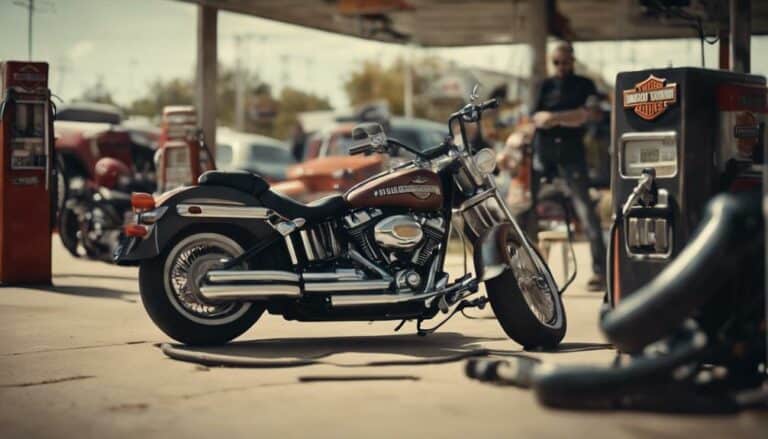If you've ever wondered what octane gas is best for your Harley Davidson, you're not alone. With the complexity of fuel options available, choosing the right octane level can be a crucial decision for your motorcycle's performance.
Understanding how octane impacts your engine's operation is key, and knowing why Harley-Davidson recommends certain octane levels can make a significant difference in how your ride performs.
So, before you hit the road, let's explore the importance of selecting the correct octane for your Harley Davidson and how it can affect your overall riding experience.
Key Takeaways
- High octane fuel is crucial for preventing engine knocking and power loss in Harley-Davidson motorcycles.
- Recommended octane levels vary, with higher octane benefiting high-performance models.
- Octane rating directly impacts engine knocking resistance, crucial for engine health.
- Consult the owner's manual for precise octane recommendations to ensure optimal performance.
Importance of Octane Rating
Understanding the importance of octane rating is crucial for maximizing the performance and longevity of your Harley-Davidson motorcycle. Your Harley-Davidson and most motorcycle engines are designed to run on high octane fuel, typically with a minimum octane rating of 91 or higher. Using fuel with a lower octane rating than what's recommended can lead to engine knocking, which not only reduces power but can also potentially cause damage over time. Higher octane fuel plays a significant role in preventing pre-ignition in high compression engines, ensuring smooth operation and longevity for your motorcycle.
It is imperative to consult your owner's manual to determine the specific octane rating recommended for your Harley-Davidson model. Following the guidelines outlined in the manual will help you avoid potential issues related to using the incorrect fuel type. Selecting the correct octane fuel, as per what the owner's manual says, is essential for maintaining the health and performance of your Harley-Davidson motorcycle.
Harley-Davidson's Recommended Octane Levels
Harley-Davidson recommends a minimum octane rating of 87 for optimal performance of their motorcycles. For some high-performance models, using a higher octane fuel, such as 91, may provide added benefits.
Using lower octane levels than specified can result in engine knocking, potentially compromising performance. Opting for ethanol-free fuel is a viable choice for Harley-Davidson bikes, contributing to improved overall performance.
To ensure you're using the correct octane level for your Harley-Davidson motorcycle, make sure to refer to the owner's manual for the manufacturer's specific recommendations. It's crucial to adhere to these guidelines to maintain the longevity and efficiency of your motorcycle's engine.
Understanding Octane and Engine Performance
To optimize engine performance in your Harley-Davidson motorcycle, the octane rating of the fuel you choose plays a critical role. The octane rating indicates the fuel's ability to resist engine knocking or pinging. Higher octane fuel is crucial for engines with higher compression ratios, like those in Harley-Davidson bikes, as it prevents premature ignition and ensures smooth operation.
Octane and Engine Performance
| Octane Rating | Performance Impact | Recommendation |
|---|---|---|
| Below 91 | Increased knocking/pinging | Avoid for Harley engines |
| 91 | Optimal performance | Recommended minimum |
| Above 91 | No added performance benefits | Not necessary |
Using fuel without ethanol is also beneficial for motorcycle engines, as ethanol can attract moisture and lead to fuel degradation. When selecting fuel for your Harley-Davidson, always refer to the owner's manual for the specific octane rating required for your model. Remember, choosing the right octane fuel is crucial for the longevity and efficiency of your Harley-Davidson motorcycle.
Factors Influencing Octane Requirement
Factors influencing the octane requirement in Harley-Davidson motorcycles include engine design, operating conditions, and fuel quality. When considering the optimal octane gas for your Harley, keep in mind the following:
- Compression Ratios: Higher compression ratios in Harley-Davidson engines demand the use of fuel with a higher octane rating to prevent premature ignition, which can lead to engine knocking and reduced performance.
- Elevation: Changes in elevation can impact the octane requirement of your Harley due to variations in air density. At higher altitudes, the air is less dense, affecting the engine's compression ratios and potentially necessitating a different octane level for optimal performance.
- Fuel Quality: Using gasoline with the recommended octane rating is essential for proper engine function. Lower-grade gas can lead to engine knocking, reduced power output, and potentially long-term damage to your Harley-Davidson motorcycle.
Understanding these factors will help you make informed decisions when selecting the right octane gas for your Harley-Davidson, ensuring optimal performance and longevity for your beloved ride.
Tips for Choosing the Right Octane
Considering the engine design, operating conditions, and fuel quality, your choice of octane gas plays a crucial role in optimizing the performance and longevity of your Harley Davidson motorcycle. When selecting the right octane for your bike, it's essential to note that higher octane fuels are recommended for engines with high compression ratios, such as those found in many Harley models. These high compression engines benefit from the increased resistance to pre-ignition provided by higher octane fuels, reducing the risk of knocking and potentially enhancing overall performance.
Additionally, higher octane fuels are less likely to contain ethanol, which can be detrimental to certain engine components if present in high quantities. Consult your owner's manual to determine the specific octane rating recommended by Harley-Davidson for your motorcycle. Ensuring the correct octane fuel is used won't only prevent engine damage but also contribute to the longevity and optimal functioning of your Harley Davidson.
Remember to fill your gas tank with the appropriate octane fuel to keep your ride running smoothly.
Conclusion
In conclusion, always refer to your Harley Davidson owner's manual for the recommended octane level to ensure optimal engine performance.
Using the correct octane gas is like giving your motorcycle the perfect fuel to ignite its potential, preventing issues like pre-ignition and engine knocking.
Choose wisely to keep your ride running smoothly and efficiently for years to come.

